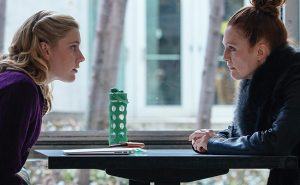
“Maggie’s Plan” seems written for Greta Gerwig. Not only does the film play to her strengths, but the film’s tone matches her exuberance. Greta has found herself a niche, one I suspect matches her actual personality. She almost always plays the role of the plucky idealist, whose warmhearted approach is her ultimate downfall. By not accepting life’s limitations and complexities, she stunts herself. She’s always on the cusp of the good life, but is too afraid to swing at the curveballs of life.
Maggie is no different. She wants to have a child, but doesn’t want to wait around for the right man to give her one. She’s never had a serious relationship last past six months because she doesn’t have the patience to deal with the hurdles that come with it. She’s fine in dealing with these hurdles for others, as her profession has her directing art student graduates into successful avenues. Yet, when it comes to herself, she stumbles. She’s afraid to fail and, most importantly, deal with said failure. That’s why she chooses Guy (Travis Fimmel), a brilliant mathematician who is a pickle entrepreneur (because these kinds of films always have eccentric occupations). Guy is sweet, gentle, and smart, all qualities she wants in her child. Best of all, he understands he’s nothing more than a sperm donor. Even when he sweetly makes a move, he accepts Maggie’s polite declination.

As fate would have it, Maggie finally falls in love just as she’s about to go through with the artificial insemination. Her destiny is John (Ethan Hawke), an anthropologist whose marriage to the philosopher Georgette (Julianne Moore), is crumbling. He leaves his wife for Greta and the two get hitched and have a baby. Knowing this is a Greta Gerwig film, this isn’t the happy ending it seems to be.
Three years go by and Maggie finds herself slowly falling out of love with John. Initially, she found Georgette to be the problem, a control freak who never supported her husband’s fictional writing. As it turns out, John is the self-absorbed one (well, more so), a man-child of sorts who needs someone to keep him in check. Georgette was that woman and Maggie knows it. Maggie also knows Georgette is still in love with her ex, and suspects John is too, and hatches a plan to get them back together.

The notion that someone would concoct a scheme to bring a divorced couple back together as opposed to simply breaking things off and moving on is preposterous! Maggie, too, is preposterous, and that’s why we believe in her. We know her just as well as her best friends, Tony (Bill Hader) & Felicia (Maya Rudolph), do, who point out to her that she’s too afraid of facing her consequences. She’d rather make it seem as if the two fell back in love instead of taking responsibility for her actions. Hell, even Georgette tells her so when she proposes the plan to her! Normally, this type of on-the-nose dialogue is a cheap way of explaining the message to the audience, but such is not the case here. The characters aren’t divulging the psychological defects of Maggie for the audience to understand, but for Maggie to.
Rebecca Miller, who wrote and directed the film (off of a story by Karen Rinaldi), has Maggie down to a tee. She understands her completely, directing the film in the way in which Maggie sees the world. This is both the film’s strength and greatest weakness. The strength comes from making the film about the character and not the situation. The weakness comes from diminishing the impact of Maggie’s actions by holding back on life’s complications, just as Maggie does. This is beautiful characterization, but flimsy mechanically in which to hang the film on!

The character of Maggie needs to exist in the world as opposed to the world existing in Maggie. Miller touches upon this, but never expands upon it. Her direction feels in debt to Greta Gerwig, playing to her strengths and usual quirks and never challenging her. The film’s best moments come from when Maggie has to face the realities of life and tackle the hardships. Having the screenplay work around these hardships to eventually cave in to her idealism tarnishes the journey of self-discovery. Optimism wins out in the end, even if it doesn’t go quite according to Maggie’s plan.
It’s hard not to like “Maggie’s Plan.” It’s light and breezy, just like its star. It left me wanting more though, and even teased me with such. Miller plays it too safe, just like Maggie. It’s an endearing quality, but one that never fully wins one over.
Final Rating: B-
